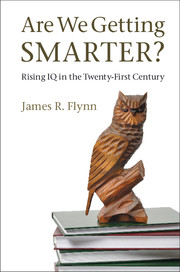Book contents
- Frontmatter
- Contents
- List of Figures
- List of Tables
- List of Boxes
- Acknowledgments
- 1 Opening windows
- 2 IQ and intelligence
- 3 Developing nations
- 4 Death, memory, and politics
- 5 Youth and age
- 6 Race and gender
- 7 The sociological imagination
- 8 Progress and puzzles
- Appendix I IQ trends
- Appendix II Capital cases and comparing the WAIS-III IQs of various nations
- Appendix III Adult/child IQ trends and bright taxes/bonuses
- Appendix IV Gender and Raven’s
- Appendix V Wonderful paper on causes of Raven’s gains
- References
- Subject index
- Name index
Appendix V - Wonderful paper on causes of Raven’s gains
Published online by Cambridge University Press: 05 November 2012
- Frontmatter
- Contents
- List of Figures
- List of Tables
- List of Boxes
- Acknowledgments
- 1 Opening windows
- 2 IQ and intelligence
- 3 Developing nations
- 4 Death, memory, and politics
- 5 Youth and age
- 6 Race and gender
- 7 The sociological imagination
- 8 Progress and puzzles
- Appendix I IQ trends
- Appendix II Capital cases and comparing the WAIS-III IQs of various nations
- Appendix III Adult/child IQ trends and bright taxes/bonuses
- Appendix IV Gender and Raven’s
- Appendix V Wonderful paper on causes of Raven’s gains
- References
- Subject index
- Name index
Summary
As this book was going to press, I was sent a paper that advances our knowledge of what goes on in the minds of people today so that they score much better on Raven’s than previous generations. Hitherto my explanation of why similarities scores had increased was more adequate than my explanation of why Raven’s scores had increased. As to the latter, I could say only that the utilitarian habits of mind of our ancestors tied their use of logic to the concrete world of physical objects, while the scientific ethos we live in made using logic on symbols and abstractions (often far removed from the concrete) more congenial.
Fox and Mitchum have written a paper that adds substance to the explanation of Raven’s gains: mainly that Raven’s (they used the Advanced Progressive Matrices Test) scores between generations rise on items that are further and further away from taking images at face value and more toward ascribing them symbolic significance. In my system, the sociological key is that utilitarian manipulation of the real world means that the representational image of objects is primary. If you are hunting, you do not want to shoot a cow rather than a deer. If a bird is camouflaged by being in a bush, you flush it out so its shape can be clearly seen. On the other hand, what Raven’s often asks you to do is to divine relations that emerge only if you “take liberties” with the images presented.
- Type
- Chapter
- Information
- Are We Getting Smarter?Rising IQ in the Twenty-First Century, pp. 284 - 287Publisher: Cambridge University PressPrint publication year: 2012



